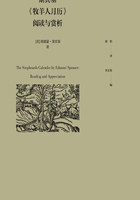
Unit One To His Booke The Shepheards Calender
Pre-reading Activity: Read the prologue and answer the questions.
1. To whom is this prologue written?
2. How many stanzas does it consist of?
3. How many lines are there in each stanza?
4. What is the rhyming style?
Text
To His Booke The Shepheards Calender:
Goe little booke : thy selfe present,
: thy selfe present,
As child whose parent is vnkent :
:
To him that is the president
Of noblesse and cheualree ,
,
And if that Enuie barke at thee,
As sure it will, for succoure flee
Vnder the shadow of his wing,
And asked, who thee forth did bring,
A shepheards swaine saye did thee sing,
All as his straying flocke he fedde:
And when his honor has thee redde ,
,
Craue pardon for my hardyhedde .
.
But if that any aske thy name,
Say thou wert base begot with blame:
begot with blame:
For thy thereof thou takest shame.
thou takest shame.
And when thou art past ioepardee,
Come tell me, what was sayd of mee:
And I will send more after thee.
IMMERTO
Background
《牧羊人月历》或译作《牧羊人日记》(The Shepheardes Calender),作者最早的田园诗作,是仿照罗马诗人维吉尔等古代牧歌写成的。这十二篇《牧羊人月历》,每篇正好对应一年中的一个月份,除首尾两首外,都是对话体,主要人物是热情的牧羊人科林·克劳特。作品描绘了淳朴和谐的乡村生活,赞美人与自然的契合,略带暗讽宗教的虚伪。
《牧养人月历》的十二幅木刻画表达十二个月份的主题,每一幅图的上方有对应的星座,莎士比亚的《如你所愿》(As You Like It)借引了一月水瓶座的來源。
署名为E.K.的神秘先生撰写的歌词大意和注解大大地扩展了《牧羊人月历》的外延,每首牧歌前都配有一幅精心设计的木刻画,而结尾处都设有一句座右铭或“格言”,以此总结每一个说话者的态度。这部诗作的模式可谓集古希腊诗人忒奥克里托斯(Theocritus)、古罗马诗人维吉尔(Virgil)、曼图安努斯(Mantuanus),以及英国本土诗人约翰·斯克尔顿(John Skelton)和克里斯托弗·马洛(Christopher Marlowe)等著名诗人创作范式之大成。斯宾塞的创作风格受到过很多人的影响,但实际上对斯宾塞影响最大的人是乔叟。斯宾塞在他的作品中孜孜以求地致力于运用一种比当时英国人所用的“大杂烩词汇”更纯粹的英语语言。尽管他的语言和韵律采用了乔叟的风格,或者说力图采用乔叟式的语言和韵律,但他为牧歌体裁创立的惯例却是对古典创作风格的初次尝试:例如,维吉尔在《埃涅伊德》中一开始就承认《埃涅伊德》是一次对田园牧歌式诗歌的创作尝试。E. K. 先生也注意到了这个诗歌创作传统:作为诗歌创作界的新手,羽翼未丰之前尝试首飞以测试双翼的实力是很多诗人采用过的方式。大家都知道忒奥克里托斯的创作实力,但即使是他也做过这样的尝试。维吉尔一开始也对自己的能力缺乏自信。曼图安努斯、弗朗切斯科·彼特拉克(Francesco Petrarca)、乔万尼·薄伽丘(Giovanni Boccaccio)、马洛以及其他杰出的意大利和法国诗人也都有过试水经历。他们的影响在斯宾塞的作品中随处可见。E.K. 曾对斯宾塞做过这样的预言:“我们这位新诗人……的双翼将会一直保持最佳的飞行状态”。这个预言同时也预示了《仙后》的问世。
Chinese Version
写给《牧羊人月历》
你去吧,小册子,去向他毛遂自荐,
他是贵人,一身豪气,义薄云天:
你要像籍籍无名者之子那般,
去以这种方式出现在他面前,
如若嫉妒朝你发出吠声连连,
它肯定会,那么为了安全起见,
你就逃到他的羽翼之荫下面,
要是有人问起谁人把你生产,
你就说牧羊人之子让你颂赞,
就像上帝喂养迷途羔羊一般:
你若有幸蒙他恩典把你阅览,
请你求他原谅我的轻率随便:
但若有人问起你的尊姓台篆,
你就说你身份卑微,地位卑贱:
正因如此,你感觉到非常丢脸。
当你走出困境,安然度过危险,
就来把他对我的评价讲一遍:
我会再给他发去更多的诗篇。
无名小卒
Questions for Study and Discussion
1. What place does The Shepheards Calender hold in Edmund Spenser’s literary career?
2. What is its style?
3. What does the poem begin with?
4. Why did Spenser turn to the monuments of ruder antiquity and revived obsolete words from the writings of Chaucer and Lydgate.
5. For what purpose did the poet make use of his pastoral subject mainly?
6. What can we see when we compare the rhythms of The Shepheards Calender with those of A Mirror for Magistrates in general?